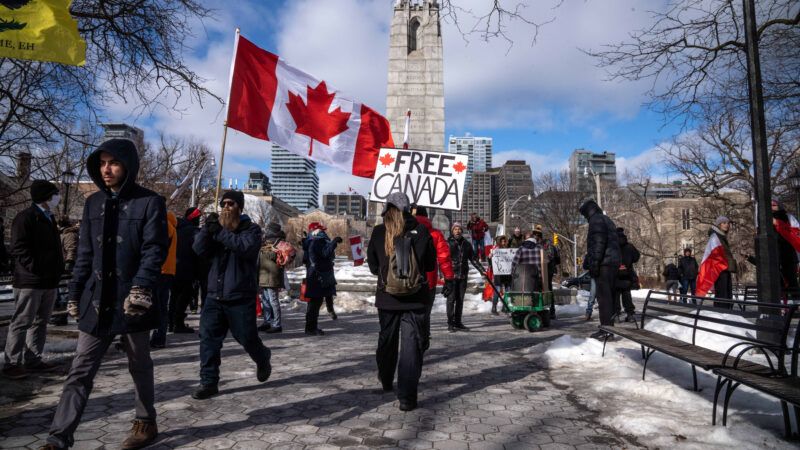Canadian Government Uses 'Terrorist Financing Act' To Target Financial Support for Freedom Convoy Truckers
Did Justin Trudeau accidentally prove crypto bros' point?

Late yesterday, Canadian Prime Minister Justin Trudeau invoked his country's Emergencies Act of 1988 in an attempt to snuff out anti-vaccine mandate protests that have roiled Canadian domestic politics for weeks. Invoking the act allows Trudeau to broaden Terrorist Financing Act rules to bring crowdfunding platforms and payment processors under greater government scrutiny.
The announcement of these new policing powers is in response to the "Freedom Convoy," a group of truckers and their supporters who have traversed Canada in recent weeks to protest in the capital city of Ottawa, demanding an end to Trudeau's requirement that truck drivers be vaccinated in order to reenter their home country when coming from the U.S. The vaccine policy was implemented in January. Citing the Canadian Trucker Alliance, the Toronto Star reported in late January that "that as many as" 16,000 truckers "may be sidelined due to the new restriction."
Trudeau said yesterday that the protesters' blockades, which have been set up at U.S.-Canada border crossings as well as on the streets of Ottawa, "are harming our economy and endangering public safety." Invoking the Emergencies Act will grant his government broad, unspecified powers to break up the protests, including calling in the military (which Trudeau has thus far hesitated to do, calling it a "last resort"). In order to invoke the Act, "there must be a belief the protesters constitute a national emergency and cannot be dealt with under existing laws," reports The Guardian.
One consequence of Trudeau invoking the Emergencies Act (successor to the War Measuers Act) is that crowd-funding platforms in Canada will come under anti-terrorist financing laws. That's insane. Trudeau has chosen a maximalist strategy to crush these protests. It won't go well. https://t.co/Man7vJUwls
— John Daniel Davidson (@johnddavidson) February 14, 2022
There is much debate over how much the protest movement represents Canada's trucking industry. Leaving aside who speaks for who, Trudeau's attempt to impose traditional banking surveillance on crowdfunding platforms and payment processors is a noteworthy development in this saga. He announced Monday that cryptocurrency exchanges and crowdfunding platforms must now report large and "suspicious" transactions to the Financial Transactions and Reports Analysis Centre of Canada (FINTRAC), thus allowing more government surveillance of who's forking over money to the protesters. The government will also be using its expanded powers to allow financial institutions to freeze the corporate accounts of companies that own trucks used in the blockades, while suspending their insurance (which could potentially end up hurting victims as well as those responsible, in addition to having little deterrent effect).
The government has already tried to exert pressure in other ways to crack down on the receipt of donations.
Earlier this month, donors raised more than $1 million for the truckers via the crowdfunding site GoFundMe, before the company removed the convoy's campaign as a recipient due to a purported terms of service violation, citing "evidence from law enforcement that the previously peaceful demonstration has become an occupation, with police reports of violence and other unlawful activity."
Since that site was rendered unusable (with contributions in the process of being refunded), donors shifted to the Christian crowdfunding site GiveSendGo, where they raised more than $9 million. Those efforts came to naught as well, with hackers leaking the names of donors and a Canadian judge issuing an injunction against the site, prohibiting "any and all parties with possession or control over these donations" from giving the money to intended recipients. (GiveSendGo's spokespeople claim this is illegal.)
This type of situation—one in which protesters are being freezed out by crowdfunding platforms, one in which the government is threatening to suppress demonstrations and surveil financial transactions—is precisely the use case for crypto, which may be why Canadian officials namechecked it in their Terrorist Financing announcement. Sure, collecting Bored Ape NFTs is cool and all, but crypto's real value lies in the fact that it's much harder to trace back to its sender, allowing pseudonymous donors to support whichever political causes they want to, no matter how transgressive. The more intermediaries you layer on, the more opportunities for surveillance, but person-to-person crypto transfers would be quite easy to pull off without reporting to FINTRAC.
These reporting requirements already exist for banks in Canada dealing with large amounts of money, just as they do in the U.S. However, monitoring cryptocurrency transactions and crowdfunding donations is not nearly so simple; it's "unclear how they'd stop a large crypto transfer if no banks are involved," notes Reason's Zach Weissmueller on Twitter. If done properly, crypto transfers hold great surveillance-evading potential.
Canada's Deputy Prime Minister: Only the government gets to decide whether or not you can support non-violent protests with your own money. https://t.co/ko30bqKHEj
— Avik Roy (@Avik) February 15, 2022
People ought to have as much freedom as possible to make donations to nonviolent anti-government political causes that are aligned with their beliefs, without government insinuation that they're supporting terrorism.
Whether it's government officials sending in muscle or private companies deeming activists to be in violation of terms of service, the liberatory promise of crypto lies in the fact that it can bypass these intermediaries and make transactions more discreet—something Trudeau's lackeys surely know, and seem a bit threatened by.


Show Comments (230)